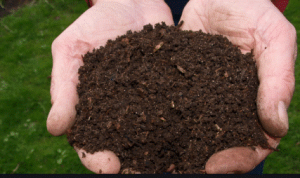Composting is the natural process of 'rotting' or decomposition of organic matter by microorganisms under controlled conditions. Raw organic materials such as crop residues, animal wastes, food garbage, some municipal wastes and suitable industrial wastes, enhance their suitability for application to the soil as a fertilizing resource, after having undergone composting.

Related Projects: Biotechnology, Bio-Technology, Industrial Biotechnology, Biotech Sector, Industry, Biotech Projects, Enzymes Papain, Phytase, Lipase, Enzyme, Food Biotechnology, Industrial Enzymes, Vermiculture, Vermicompost, Biofertilizer, Organic Farming, Biogas
Compost is a rich source of organic matter. Soil organic matter plays an important role in sustaining soil fertility, and hence in sustainable agricultural production. In addition to being a source of plant nutrient, it improves the physic-chemical and biological properties of the soil. As a result of these improvements, the soil: (i) becomes more resistant to stresses such as drought, diseases and toxicity; (ii) helps the crop in improved uptake of plant nutrients; and (iii) possesses an active nutrient cycling capacity because of vigorous microbial activity. These advantages manifest themselves in reduced cropping risks, higher yields and lower outlays on inorganic fertilizers for farmers.
Process and Usage of Aerobic Compost:-
Aerobic composting uses oxygen and bacteria and replicates natural decomposition. The process of aerobic composting can be used with all types of organic waste and is also suitable for waste that is high in nitrogen. Plant matter such as grass clippings and leaves encourage a type of bacteria to grow that produces high temperatures, up to 160 degrees Fahrenheit. Aerobic composting works quickly but requires a high amount of maintenance, as the moisture and temperature need to be monitored closely. Additionally, aerobic composting needs to be turned every few days to allow for proper air circulation. This composting process is best used outside and can be used with a large amount of materials.
Related Videos:- Fertilizers, Biofertilizer, Inorganic Fertilizers (Mineral Fertilizer), NPK, Nitrogen Fertilizer, Nitrogenous Fertilizer, Diammonium Phosphate Projects
Aerated static pile composting allows for all types of organic waste to be mixed together into one large pile. Air enters the mixture through a series of pipes and loosely piled bulking agents. This method is not efficient enough to compose animal byproducts or greases. Aerated static piles require less maintenance than Windrow composting. However, in colder climates, aerating the piles may be more troublesome. The overall temperature still must be closely monitored. With appropriate ventilation, aerated static compost piles can be used both indoors and outdoors. Aerated static piles typically produce compost within 3-6 months.
Market Insights of Aerobic Compost:-
The future of the compost market looks promising with opportunities in the agriculture, home gardening, landscaping, horticulture, and construction industries. The global compost market is expected to reach an estimated $9.2 billion by 2024 with a CAGR of 6.8% from 2019 to 2024. The major drivers for this market are increasing demand for organic products and growing awareness regarding disadvantages of chemical fertilizer and pesticides.

Related Books:- Biofertilizer, Biofertiliser,Biogas, Organic Farming, Vermicompost, Vermiculture,Biotechnology
Vegetable Market have become major sources of organic waste. Some of such waste when being diverted to landfills not only increase the landfill loading but also contribute to increase greenhouse gas emission. Of the many technologies available in handling such hugely generated waste, composting has proven very effective for decades. Enzyme and non-enzyme mediated aerobic composting of vegetable market complex waste (VMCW) have been investigated. Conventional composting technique though being capable of handling large quantum of waste are found to consume more time. In the present investigation, the pre-cultured seed inoculums used for vegetable market complex waste, shortened the typical composting period from 45 to 9 days for the first time. Also, rapid size and volume reduction of VMCW was witnessed.
Conclusion:-
NPCS has made this project report that covers all the aspects of business, from analyzing the market, confirming availability of various necessities such as plant & machinery, raw materials to forecasting the financial requirements. The reports made by NPCS has helped many of the engineers, project consultant & industrial consultancy firms in India and worldwide to do their business analysis.
Noo_Art2021
#DetailedProjectReport #businessconsultant #BusinessPlan #feasibilityReport #NPCS #industrialproject #entrepreneurindia #startupbusiness #BusinessIdeas #StartupBusinessIdeas #BusinessOpportunity #AerobicCompost #benefitscompost #composting